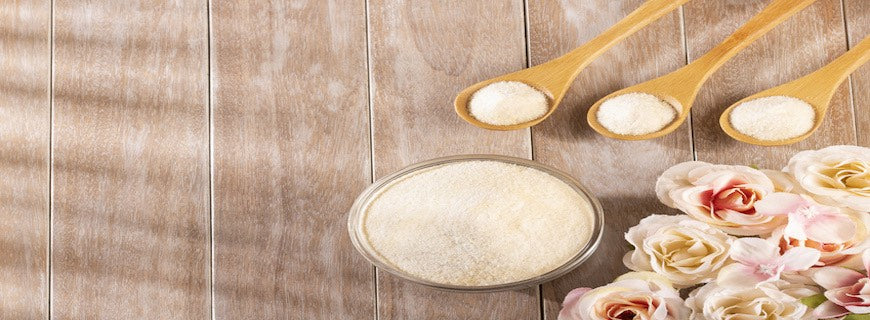Weird and wonderful ingredients have a habit of popping up in the supplement industry, and chicken collagen is one of the more recent success stories. Given the protein is found in cartilage, bone and other tissues, it’s perhaps no surprise that collagen supplements (including collagen protein and bone broth) are almost always formulated to improve joint and bone health. But there are other uses.
In this article, we intend to summarise some of the more popular uses of collagen. Although most of our focus will be on chicken collagen, since that appears to be the most popular ingredient employed for these purposes, we will also take a look at marine collagen and explore the similarities and differences between the two.
Let's get to it.
What is Collagen?
Collagen is the most abundant protein in the body, located in muscles, bone, tendons, the skin and internal organs.
In essence, this fibrous, building-block protein helps to hold the body together. Amazingly, some forms of collagen are stronger, on a gram-per-gram basis, than steel.
The vast majority of collagen in the body belongs to types 1, 2 and 3, each with its own unique structure and function. While types 1 and 3 are typically associated with bones, skin, hair and nails, type 2 collagen services joints and cartilage. Indeed, type 2 makes up around 60% of protein in cartilage and as much as 90% of collagen in articular cartilage.
Collagen degrades over time, as a natural part of ageing. However, other factors deplete collagen in the body. These include tobacco, alcohol, poor nutrition (especially vitamin C deficiency and a surplus of pro-inflammatory foods), excess sun exposure and lack of sleep.
If your lifestyle habits are on the unhealthy side, your collagen production is almost certainly suffering. The consequence can be wrinkled or sagging skin, as well as arthritis-like symptoms such as joint pain.
Since no supplier is yet harvesting this valuable protein from healthy humans, chicken collagen is the solution most often recommended. Generally extracted from chicken cartilage, chicken collagen is a rich source of amino acids glycine, proline and hydroxyproline and could well provide relief for a variety of conditions.
Of course, chicken collagen is not the only form on the market: cow collagen, pig collagen and marine collagen are all commercially available. As ever, quality is key: so pay close attention to the method of processing. Not all collagen proteins are the same.
Chicken Collagen for Arthritis: What Does the Research Say?
A number of studies highlight the efficacy of chicken collagen in decreasing joint pain and stiffness from arthritis.
In one which looked specifically at knee osteoarthritis, intake of native type 2 collagen (from chicken sternum cartilage) resulted in fewer swollen joints, joint tenderness and better walk time when compared with a placebo. What’s more, there were no side effects.
Meanwhile, in a 2017 review paper published in the British Journal of Sports Medicine, collagen was listed as one of 7 supplements to have “demonstrated large and clinically important effects for pain reduction at short term” for osteoarthritis.
The other supplements were passion fruit peel extract, Curcuma longa extract, Boswellia serrata extract, curcumin, pycnogenol and L-carnitine.
It’s not just osteoarthritis either. A 2009 double-blind trial involving over 500 subjects with rheumatoid arthritis established that collagen supplements improved pain markers, morning stiffness, tender joint count and swollen joint count.
While it’s not possible to say that everyone with arthritis will experience relief by taking supplemental collagen – there are far too many factors involved to suggest a panacea – we can say that collagen represents a novel option. Incidentally, you might like to read our article Natural Remedies for Arthritis Pain, which summarises some of the best options.
Cosmetic Uses of Chicken Collagen
Collagen has been suggested as a means of nourishing skin. This is because naturally, collagen helps skin cells renew and repair.
In fact, your skin is composed of 75% collagen. As such, smooth, soft skin is typically a result of healthy collagen production.
Indeed, research suggests that the primary difference between radiant and sagging skin is the density of the collagen matrix.
Collagen supplementation was put under the microscope in a 2014 study, which sought to establish whether it could enhance the skin of women aged 35-55. The double-blind, placebo-controlled trial confirmed a significant improvement in skin elasticity after just 4 weeks.
Skin moisture and skin evaporation also benefitted, although such improvements were ‘less statistically significant’.
A separate study, meanwhile, showed improvements in wrinkles, roughness, moisture and elasticity after eight weeks of collagen supplementation.
According to skin specialist Paul Banwell, “Collagen drinks increase collagen in the bloodstream which in turn trigger the body’s own collagen production by firing up the fibroblasts, our own collagen factories.”
One thing worth noting: the process of collagen formation is heavily dependent on vitamin C. If you want to maximise your skincare routine, therefore, make sure you’re getting enough dietary vitamin C. (Arginine and zinc also impact collagen synthesis.)
As far as cosmetic benefits are concerned, collagen may also help to strengthen nails and restore lustre to hair. More studies are needed, however.
Chicken Collagen vs Marine Collagen
While chicken collagen is largely composed of type 2, the ideal form for building cartilage due to its provision of chondroitin sulfate and glucosamine sulfate, marine-derived collagen mostly supplies type 1.
Distinct from its counterpart, marine collagen also contains a high concentration of the amino acid hydroxyproline, which is highly effective at creating collagen in the body.
Type 1 is considered to be the best option for cosmetic purposes and marine collagen in particular is credited for its easy absorption.
Of course, you should bear in mind that collagen consumption is about rebuilding all of your collagen, not just Type 1, 2 or 3. Healthy collagen production across the board should be the ultimate goal. A variety of collagen sources can help in this regard.
Conclusion
Whether you’re looking to strengthen connective tissues, maintain strong bones or ensure smooth, supple skin, chicken collagen is a great choice of supplement. The thing is, many products on the market come laden with added sugars and artificial sweeteners, not to mention additional chemical additives.
Hydrolyzed collagen, in case you’re wondering, refers to collagen produced from a process of triturating bone and cartilage into tiny components known as gelatin: a process which makes the protein much easier on the stomach, all the better for the body to digest and use.
Oh, and if supplementation isn’t on your agenda, do everything in your power to preserve your own collagen production: that means no smoking, adequate hydration, sensible nutrition and a good level of fitness. Oh, and the occasional facial massage can work wonders.
Water for Health Ltd began trading in 2007 with the goal of positively affecting the lives of many. We still retain that mission because we believe that proper hydration and nutrition can make a massive difference to people’s health and quality of life. Click here to find out more.




























Leave a comment